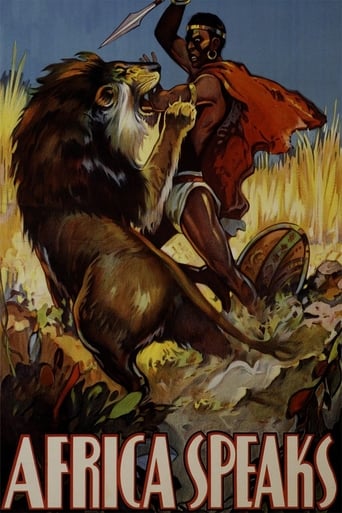

Some things I liked some I did not.
... View MoreWatch something else. There are very few redeeming qualities to this film.
... View MoreThe film makes a home in your brain and the only cure is to see it again.
... View MoreThere are moments that feel comical, some horrific, and some downright inspiring but the tonal shifts hardly matter as the end results come to a film that's perfect for this time.
... View MoreExplorer Paul Hoefler is seen crossing Africa in this hit pre-mondo documentary from Mascot. The great wildlife footage includes a vast swarm of locusts. "Duck-billed" women of the Ubangi have plates stretching their lips. A tribe of Pigmys are "darn clever". Less clever is a native made to look foolish by eating a mouthful of salt in one of several staged scenes (occasionally Hoefler and companion can be seen superimposed in front of other footage). Another staged scene has a guide "boy" attacked by a lion (Hoefler doesn't seem concerned). 58 b/w mins. narrated (comically) by Lowell Thomas. Futter followed with the less well-known India SPEAKS in 1933. Footage from Africa was re-used ad nauseum in the BOMBA series of jungle adventures from Monogram, starting in 1949.Movie reviews at spinegrinderweb.com
... View MoreIn some ways, there is a lot to like about this documentary. After all, it's one of the film to use sound footage--after many previous silent African safari films. In addition, the footage is excellent--well filmed and not chock full of stock footage like some documentaries. I liked seeing and learning about the pygmy tribes and the various animals. However, at the same time, there is an often annoying narration. Too often, the narrator tries to sound clever--making terribly unfunny jobs and supposedly glib comments. But they all come off badly and seem, at times, a bit condescending towards the subject matter--though I must also admit that the narration about the pygmies is not. It's really a shame, as with better narration, this would have been an exciting film to watch---especially since I learned some wonderful things about the animals and people of this continent....when I wasn't groaning at the narration! If you want to see it, follow the link on IMDb and you can copy it free to your hard drive since it's in the public domain.
... View MoreSeptember 4, 2008, I saw this again after sixty plus years, in an Internet Archive copy that has only 50 of the original 75 minutes, and was mesmerized to realize how much of my concept of Africa is due to this movie. Rivers, canoes, safaris, multiple tribes, locusts, lions, wildebeest, giraffes, impalas, elephants, flamingoes, warthogs are all here, in the heat. The sequence on the jumping impalas was most impressive to me now, as I recall nothing like it in any other movie. The only warning to the modern viewer is that the narration, while lively and fascinatingly informative, contains comments, evaluations and comparisons that seem shockingly inappropriate. Clearly this movie had an enormous influence on movie-making, from "King Kong" through "The Living Desert" to "The Lion King". This movie is the successful ancestor of anything you see on Animal Planet and most of Discovery Channel.
... View MoreThis film is striking for several reasons. The obvious footage of animals and insects was magnificent, and so was the scenes of the veldt, regardless of the animals. But, beyond that, the whole feeling of the daily hardship of life on the African continent 70 odd years ago was almost overwhelming. This film brought the living in fear of lions, locust, tsetse flies and other dangers into sharp relief for me. It was well worth watch if only to get the historical sense of life on the dark continent.
... View More